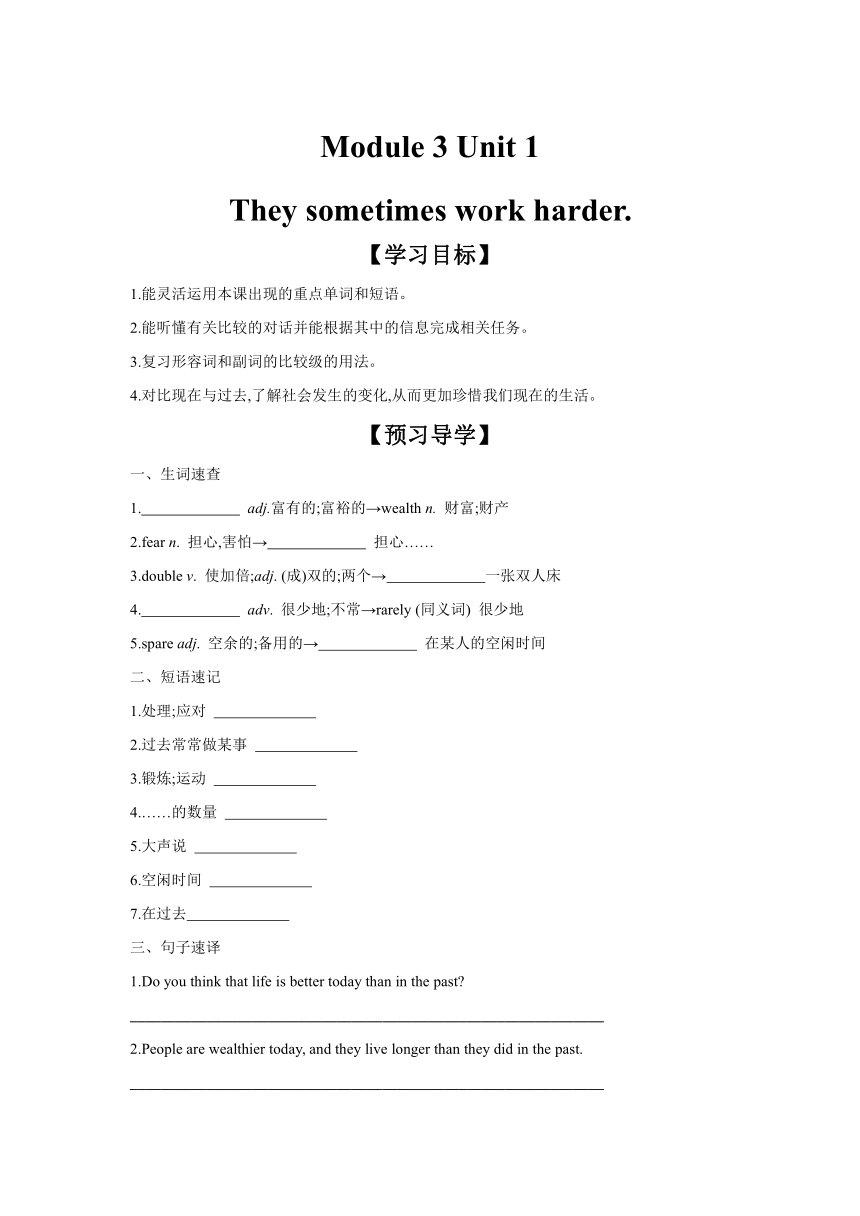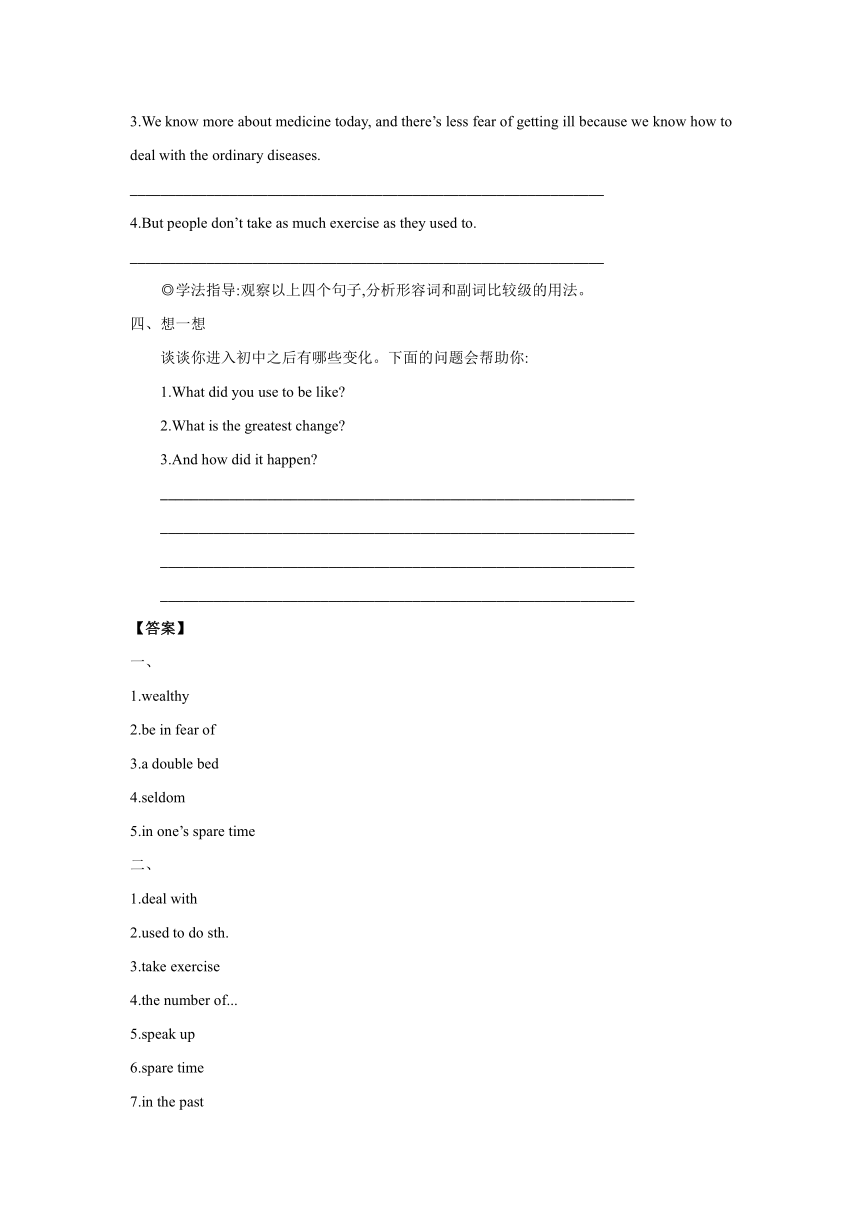外研版九年级下册Module 3 Life now and then Unit 1 学案(含答案)
文档属性
| 名称 | 外研版九年级下册Module 3 Life now and then Unit 1 学案(含答案) |

|
|
| 格式 | docx | ||
| 文件大小 | 19.6KB | ||
| 资源类型 | 教案 | ||
| 版本资源 | 外研版 | ||
| 科目 | 英语 | ||
| 更新时间 | 2024-02-26 00:00:00 | ||
图片预览


文档简介
Module 3 Unit 1
They sometimes work harder.
【学习目标】
1.能灵活运用本课出现的重点单词和短语。
2.能听懂有关比较的对话并能根据其中的信息完成相关任务。
3.复习形容词和副词的比较级的用法。
4.对比现在与过去,了解社会发生的变化,从而更加珍惜我们现在的生活。
【预习导学】
一、生词速查
1. adj.富有的;富裕的→wealth n. 财富;财产
2.fear n. 担心,害怕→ 担心……
3.double v. 使加倍;adj. (成)双的;两个→ 一张双人床
4. adv. 很少地;不常→rarely (同义词) 很少地
5.spare adj. 空余的;备用的→ 在某人的空闲时间
二、短语速记
1.处理;应对
2.过去常常做某事
3.锻炼;运动
4.……的数量
5.大声说
6.空闲时间
7.在过去
三、句子速译
1.Do you think that life is better today than in the past
______________________________________________________________
2.People are wealthier today, and they live longer than they did in the past.
______________________________________________________________
3.We know more about medicine today, and there’s less fear of getting ill because we know how to deal with the ordinary diseases.
______________________________________________________________
4.But people don’t take as much exercise as they used to.
______________________________________________________________
◎学法指导:观察以上四个句子,分析形容词和副词比较级的用法。
四、想一想
谈谈你进入初中之后有哪些变化。下面的问题会帮助你:
1.What did you use to be like
2.What is the greatest change
3.And how did it happen
______________________________________________________________
______________________________________________________________
______________________________________________________________
______________________________________________________________
【答案】
一、
1.wealthy
2.be in fear of
3.a double bed
4.seldom
5.in one’s spare time
二、
1.deal with
2.used to do sth.
3.take exercise
4.the number of...
5.speak up
6.spare time
7.in the past
三、
1.你觉得如今的生活比过去更好吗
2.现在的人们比过去富有了,也比过去长寿了。
3.我们如今对医学懂得更多了,而且也不那么害怕生病了,因为我们知道怎样治疗普通的疾病。
4.但是人们锻炼得也不如从前那样多了。
四、
How time flies! Three years has passed. Of course I have changed a lot. Let me show you my changes.
I used to be really short and thin. I used to be shy and quiet. I was always silent in class. But now I have changed a lot. But one of the greatest changes is that I become more outgoing. What made me change a lot I remember when I was in Grade Eight, there was an English speech in our school. I wanted to take part in it, but I was afraid of it. Our English teacher, Mr. Wang encouraged me to take part in it. He guided me a lot, and I practiced a lot every day. Finally, I won the first prize in the speech contest. I felt very proud and happy. Since then, I have been more outgoing.
【合作探究】
任务驱动一 听说训练
1.播放录音,完成Part ②的练习。
◎学法指导:先浏览问题,明确要听的信息,听录音时理解对话的主旨大意,记录关键信息,全班核对答案。
2.播放Part ③录音,回答以下问题。
(1)What are Betty and her mother talking about
______________________________________________________________
(2)How many things have they compared What are they
______________________________________________________________
3.学生自读Part ③的对话,全班核对Part ③的答案。
4.学生自读Part ③的对话,比较过去和现在的生活的优劣。
◎学法指导:引导学生归纳形容词和副词比较级的用法。
用括号内所给单词的适当形式填空。
(1)Lucy is organized and her room always looks (tidy) than mine.
(2)In Gretel’s mind, Hansel was the (brave) person in the world.
(3)Nowadays, better medical care and cleaner water help people live (long).
(4)The harder you work, the (luck) you will be.
(5)—Which dog do you think is (lazy), Hobo or Eddie
—I think Eddie is.
任务驱动二 词汇和口语训练
1.小组内完成Part ④的练习,全班核对答案。
2.朗读Part ⑤的小短文,感知需要重读的句子成分。
◎学法指导:一般来说,在句子中需要重读的词都是实词,比如:名词、动词、形容词、副词、数词和代词等。不需要重读的多为虚词,比如:冠词、连词、介词和感叹词等。
3.小组内完成Part ⑦,两人一组,谈谈你对教育、环境或健康的见解并说明原因。
(1)What are you pleased with education
______________________________________________________________
(2)What are you unpleased with education
______________________________________________________________
【答案】
任务驱动一:
2.(1)They are talking about life in the past and now. / They are comparing life in the past and now.
(2)Four. Health, medicine, transport and work.
4.(1)tidier (2)bravest (3)longer (4)luckier
(5)lazier
任务驱动二:
3.(1)Every child has the right to go to school and the government tries to provide better learning environment for students.
(2)The students in poor areas get fewer and fewer resources than those in developed areas now.
【知识超市】
[命题点一]People are wealthier today...如今人们更富有了……
【例句呈现】
1.The farmers are looking forward to having a wealthy life. 农民期待过上富裕的生活。
2.These young men become wealthier than before by working hard. 这些年轻人通过努力工作变得比以前更富裕了。
3.This is one of the wealthiest villages in the countryside. 这是乡下最富裕的一个村庄之一。
【用法小结】wealthy意为“富裕的”,是形容词原级;其比较级为wealthier;其最高级为wealthiest;其同义词为rich;其反义词为poor。
【拓展】wealthy的名词为wealth,意为“财富”。如:her great wealth 她的巨额财富。
对点自测
根据句意及汉语提示填空
1.The main purpose of industry is to create (财富).
2.He became a (富裕的) businessman in his thirties.
【答案】
1.wealth 2.wealthy
[命题点二]When the number of cars is doubled, the pollution is also doubled, or even worse. 当汽车的数量成倍的时候,污染也会加倍,或者甚至更糟糕。
【例句呈现】
1.The number of the students in our school is rising year by year. 我们学校学生的数量正在逐年增长。
2.A number of people have already read the book. 许多人已经读过这本书了。
【用法小结】(1)the number of 意为“……的数量”, 后接可数名词的复数形式;作主语时,中心词是number,谓语用单数形式。
(2)a number of意为“许多”, 相当于many,修饰可数名词复数。作主语时,谓语动词用复数形式。number前可用large, small等修饰,以表示程度。
对点自测
用括号内所给单词的适当形式填空
1.The number of the apples (be) four.
2.There (be) a number of flowers in the garden.
【答案】
1.is 2.are
They sometimes work harder.
【学习目标】
1.能灵活运用本课出现的重点单词和短语。
2.能听懂有关比较的对话并能根据其中的信息完成相关任务。
3.复习形容词和副词的比较级的用法。
4.对比现在与过去,了解社会发生的变化,从而更加珍惜我们现在的生活。
【预习导学】
一、生词速查
1. adj.富有的;富裕的→wealth n. 财富;财产
2.fear n. 担心,害怕→ 担心……
3.double v. 使加倍;adj. (成)双的;两个→ 一张双人床
4. adv. 很少地;不常→rarely (同义词) 很少地
5.spare adj. 空余的;备用的→ 在某人的空闲时间
二、短语速记
1.处理;应对
2.过去常常做某事
3.锻炼;运动
4.……的数量
5.大声说
6.空闲时间
7.在过去
三、句子速译
1.Do you think that life is better today than in the past
______________________________________________________________
2.People are wealthier today, and they live longer than they did in the past.
______________________________________________________________
3.We know more about medicine today, and there’s less fear of getting ill because we know how to deal with the ordinary diseases.
______________________________________________________________
4.But people don’t take as much exercise as they used to.
______________________________________________________________
◎学法指导:观察以上四个句子,分析形容词和副词比较级的用法。
四、想一想
谈谈你进入初中之后有哪些变化。下面的问题会帮助你:
1.What did you use to be like
2.What is the greatest change
3.And how did it happen
______________________________________________________________
______________________________________________________________
______________________________________________________________
______________________________________________________________
【答案】
一、
1.wealthy
2.be in fear of
3.a double bed
4.seldom
5.in one’s spare time
二、
1.deal with
2.used to do sth.
3.take exercise
4.the number of...
5.speak up
6.spare time
7.in the past
三、
1.你觉得如今的生活比过去更好吗
2.现在的人们比过去富有了,也比过去长寿了。
3.我们如今对医学懂得更多了,而且也不那么害怕生病了,因为我们知道怎样治疗普通的疾病。
4.但是人们锻炼得也不如从前那样多了。
四、
How time flies! Three years has passed. Of course I have changed a lot. Let me show you my changes.
I used to be really short and thin. I used to be shy and quiet. I was always silent in class. But now I have changed a lot. But one of the greatest changes is that I become more outgoing. What made me change a lot I remember when I was in Grade Eight, there was an English speech in our school. I wanted to take part in it, but I was afraid of it. Our English teacher, Mr. Wang encouraged me to take part in it. He guided me a lot, and I practiced a lot every day. Finally, I won the first prize in the speech contest. I felt very proud and happy. Since then, I have been more outgoing.
【合作探究】
任务驱动一 听说训练
1.播放录音,完成Part ②的练习。
◎学法指导:先浏览问题,明确要听的信息,听录音时理解对话的主旨大意,记录关键信息,全班核对答案。
2.播放Part ③录音,回答以下问题。
(1)What are Betty and her mother talking about
______________________________________________________________
(2)How many things have they compared What are they
______________________________________________________________
3.学生自读Part ③的对话,全班核对Part ③的答案。
4.学生自读Part ③的对话,比较过去和现在的生活的优劣。
◎学法指导:引导学生归纳形容词和副词比较级的用法。
用括号内所给单词的适当形式填空。
(1)Lucy is organized and her room always looks (tidy) than mine.
(2)In Gretel’s mind, Hansel was the (brave) person in the world.
(3)Nowadays, better medical care and cleaner water help people live (long).
(4)The harder you work, the (luck) you will be.
(5)—Which dog do you think is (lazy), Hobo or Eddie
—I think Eddie is.
任务驱动二 词汇和口语训练
1.小组内完成Part ④的练习,全班核对答案。
2.朗读Part ⑤的小短文,感知需要重读的句子成分。
◎学法指导:一般来说,在句子中需要重读的词都是实词,比如:名词、动词、形容词、副词、数词和代词等。不需要重读的多为虚词,比如:冠词、连词、介词和感叹词等。
3.小组内完成Part ⑦,两人一组,谈谈你对教育、环境或健康的见解并说明原因。
(1)What are you pleased with education
______________________________________________________________
(2)What are you unpleased with education
______________________________________________________________
【答案】
任务驱动一:
2.(1)They are talking about life in the past and now. / They are comparing life in the past and now.
(2)Four. Health, medicine, transport and work.
4.(1)tidier (2)bravest (3)longer (4)luckier
(5)lazier
任务驱动二:
3.(1)Every child has the right to go to school and the government tries to provide better learning environment for students.
(2)The students in poor areas get fewer and fewer resources than those in developed areas now.
【知识超市】
[命题点一]People are wealthier today...如今人们更富有了……
【例句呈现】
1.The farmers are looking forward to having a wealthy life. 农民期待过上富裕的生活。
2.These young men become wealthier than before by working hard. 这些年轻人通过努力工作变得比以前更富裕了。
3.This is one of the wealthiest villages in the countryside. 这是乡下最富裕的一个村庄之一。
【用法小结】wealthy意为“富裕的”,是形容词原级;其比较级为wealthier;其最高级为wealthiest;其同义词为rich;其反义词为poor。
【拓展】wealthy的名词为wealth,意为“财富”。如:her great wealth 她的巨额财富。
对点自测
根据句意及汉语提示填空
1.The main purpose of industry is to create (财富).
2.He became a (富裕的) businessman in his thirties.
【答案】
1.wealth 2.wealthy
[命题点二]When the number of cars is doubled, the pollution is also doubled, or even worse. 当汽车的数量成倍的时候,污染也会加倍,或者甚至更糟糕。
【例句呈现】
1.The number of the students in our school is rising year by year. 我们学校学生的数量正在逐年增长。
2.A number of people have already read the book. 许多人已经读过这本书了。
【用法小结】(1)the number of 意为“……的数量”, 后接可数名词的复数形式;作主语时,中心词是number,谓语用单数形式。
(2)a number of意为“许多”, 相当于many,修饰可数名词复数。作主语时,谓语动词用复数形式。number前可用large, small等修饰,以表示程度。
对点自测
用括号内所给单词的适当形式填空
1.The number of the apples (be) four.
2.There (be) a number of flowers in the garden.
【答案】
1.is 2.are
同课章节目录
- Module 1 Travel
- Unit 1 We toured the city by bus and by taxi
- Unit 2 It's a long story.
- Unit 3 Language in use
- Module 2 Education
- Unit 1 They don't sit in rows.
- Unit 2 What do I like best about school?
- Unit 3 Language in use
- Module 3 Life now and then
- Unit 1 They sometimes work harder.
- Unit 2 I think life is better today.
- Unit 3 Language in use.
- Module 4 Rules and suggestions
- Unit 1 You must be careful of falling stones.
- Unit 2 we must keep the camp clean.
- Unit 3 Language in use.
- Revison A
- Module 5 Look after yourself
- Unit 1 We'd better get you to hospital.
- Unit 2 Get off the sofa!
- Unit 3 Language in use.
- Module 6 Eating togethe
- Unit 1 When is the school-leavers' party?
- Unit 2 Knives and forks are used for most Western
- Unit 3 Language in use
- Module 7 English for you and me
- Unit 1 Have you ever been to an English corner?
- Unit 2 We all own English.
- Unit 3 Language in use
- Module 8 My future life
- Unit 1 Here's to our friendship and the future
- Unit 2 I know that you will be better at maths.
- Unit 3 Language in use
- Revison B
